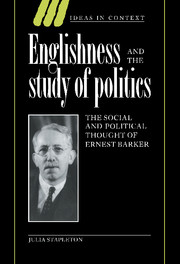Book contents
- Frontmatter
- Contents
- Acknowledgements
- Introduction: The ‘national character’ of Barker's thought
- 1 Lancashire, Idealism, and Whiggism: the making of an English political scientist
- 2 The polis, law, and the development of political studies at Oxford, 1900–1920
- 3 Society and the state in the English national past: the lure of Pluralism
- 4 Statehood, nationhood, and internationalism: English political theory and the First World War
- 5 Education and national character: the milieu of King's College London
- 6 ‘Continental’ political science and the Cambridge Chair
- 7 Traditions of civility: the construction of Englishness in the Second World War and beyond
- 8 The expansion of Englishness: the Books Commission, Europe, and the Commonwealth
- Conclusion: A late-Victorian liberal-conservative
- Select Bibliography
- Index
- Ideas in Context
5 - Education and national character: the milieu of King's College London
Published online by Cambridge University Press: 11 September 2009
- Frontmatter
- Contents
- Acknowledgements
- Introduction: The ‘national character’ of Barker's thought
- 1 Lancashire, Idealism, and Whiggism: the making of an English political scientist
- 2 The polis, law, and the development of political studies at Oxford, 1900–1920
- 3 Society and the state in the English national past: the lure of Pluralism
- 4 Statehood, nationhood, and internationalism: English political theory and the First World War
- 5 Education and national character: the milieu of King's College London
- 6 ‘Continental’ political science and the Cambridge Chair
- 7 Traditions of civility: the construction of Englishness in the Second World War and beyond
- 8 The expansion of Englishness: the Books Commission, Europe, and the Commonwealth
- Conclusion: A late-Victorian liberal-conservative
- Select Bibliography
- Index
- Ideas in Context
Summary
FROM SCHOLARSHIP TO ADMINISTRATION
We have seen in the previous chapters that the foundation of Barker's thought had been laid by the end of the First World War. It was a workable, if somewhat fragile balance between a range of ideas about society and the state in British political thought at the turn of the century. Moreover, it was ensconced within a broader framework of English cultural values, attitudes, and images. His intellectual efforts hitherto were rewarded with invitations to visit colleges in the United States in 1920 and 1929; and the award of a Doctor of Laws degree from Edinburgh in 1921, a Doctor of Letters from Oxford in the following year, and a Doctor of Laws from Harvard when he visited America in 1929. The latter especially pleased him as it constituted – in his mind – ‘the greatest honour the USA can do to an Englishman’. Also, by attaining it, he followed in the footsteps of a political scientist whom he much admired, Lord Bryce.
But despite this recognition, his work was yet to be consolidated more fully; it existed in broad outlines only, with much elaboration and integration still to come from the 1930s onwards. It was not until after 1927 – when he secured the Chair of Political Science at Cambridge – that he turned to this task.
- Type
- Chapter
- Information
- Englishness and the Study of PoliticsThe Social and Political Thought of Ernest Barker, pp. 111 - 127Publisher: Cambridge University PressPrint publication year: 1994



